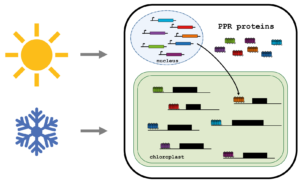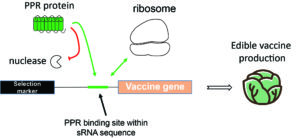Projects on PPR-Proteins

PPR proteins as regulators of the acclimation of chloroplast RNA metabolism
Pentatricopeptide repeat (PPR) proteins are RNA-binding proteins with high specificity. This protein family is present in almost every eukaryotic genome. Encoded in the nuclear genome, most members are imported post-translationally into the two endosymbiotic organelles, the mitochondrion and the chloroplast. In these DNA-containing organelles they bind RNA transcripts and influence organellar gene-expression post-transcriptionally.
Plants as sessile organisms need to acclimate to environmental conditions. In temperate regions plants experience low temperatures and shorter day-length during winter and elevated temperatures with increased light intensities during summer. Temperature and light quantities are integrated by plants and result in acclimation responses that include reprogramming of gene expression patterns.
The genes encoded in the chloroplast genome are regulated predominantly on the post-transcriptional level. PPR proteins impact RNA stability and influence the rate of translation of individual chloroplast mRNAs. Our goal is to understand how PPR proteins reprogram chloroplast gene-expression in response to environmental signals, especially temperature.
Publications
- Ruwe H, Gutmann B, Schmitz-Linneweber C, Small I, Kindgren P
The E domain of CRR2 participates in sequence-specific recognition of RNA in plastids.
New Phytol. 2019 Apr;222(1):218-229. doi: 10.1111/nph.15578. Epub 2018 Dec 6. - Rojas M, Ruwe H, Miranda RG, Zoschke R, Hase N, Schmitz-Linneweber C , Barkan A
Unexpected functional versatility of the pentatricopeptide repeat proteins PGR3, PPR5 and PPR10.
Nucleic Acids Res. 2018 Nov 2;46(19):10448-10459. doi: 10.1093/nar/gky737. - Ferrari R, Tadini L, Moratti F, Lehniger MK, Costa A, Rossi F, Colombo M, Masiero S, Schmitz-Linneweber C, Pesaresi P
CRP1 Protein: (dis)similarities between Arabidopsis thaliana and Zea mays
In: Front Plant Sci. 2017 Feb 15;8:163. doi: 10.3389/fpls.2017.00163. eCollection 2017. PMID: 28261232 Free PMC Article - Douchi D, Qu Y, Longoni P, Legendre-Lefebvre L, Johnson X, Schmitz-Linneweber C, Goldschmidt-Clermont M
A Nucleus-Encoded Chloroplast Phosphoprotein Governs Expression of the Photosystem I Subunit PsaC in Chlamydomonas reinhardtii
In: Plant Cell. 2016 April 25, 28(5):1182-99, doi:: http://dx.doi.org/10.1105/tpc.15.00725 - Ruwe H, Wang G, Gusewski S, Schmitz-Linneweber C
Systematic analysis of plant mitochondrial and chloroplast small RNAs suggests organelle-specific mRNA stabilization mechanisms
In: Nucleic Acids Res. 2016 May 27, pp. 1-12. doi: 10.1093/nar/gkw466
PPR proteins as biotech tools
The chloroplast is a prime target for genetic engineering in plants, offering various advantages over nuclear transformation. For example, chloroplasts allow the expression of polycistronic transcripts and thus to engineer complex metabolic pathways. Each cistron within such a longer transcript needs its own expression elements. Within the 5’-UTR, such expression elements are needed for stabilizing mRNAs and for translation of the downstream reading frame.
Key players in chloroplast transcript stabilization and translation are pentatricopeptide repeat (PPR) proteins. PPR proteins that stabilize mRNAs leave behind short RNA footprints that are indicators of their activity. We identified such sRNAs in various plant species and have used them to stabilize and stimulate translation of mRNAs from synthetic transgenes in chloroplasts. Our goal is to develop a PPR protein-based toolbox to allow expression of various transgenes. Currently, we are focusing on the production of antigens for vaccination and on the production of enzymes relevant for biotechnological applications.
Publications
Legen J, Ruf S, Kroop X, Wang G, Barkan A, Bock R, Schmitz-Linneweber C
Stabilization and translation of synthetic operon-derived mRNAs in chloroplasts by sequences representing PPR protein-binding sites. Plant J. 2018 Apr;94(1):8-21. doi: 10.1111/tpj.13863.
